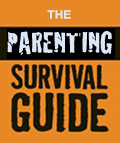 I love the following piece by author and clinical psychologist Harriet Lerner — so simple and so wise. It is an excerpt from her latest, easy-to-read and very worthwhile book, Marriage Rules: A Manual for the Married and Coupled Up. This specific piece (from a chapter on the challenges that parenting presents to couple-hood) offers ten tips for survival.
I love the following piece by author and clinical psychologist Harriet Lerner — so simple and so wise. It is an excerpt from her latest, easy-to-read and very worthwhile book, Marriage Rules: A Manual for the Married and Coupled Up. This specific piece (from a chapter on the challenges that parenting presents to couple-hood) offers ten tips for survival.
* * *
1. Don’t go it alone. We are here to help each other, and once you have children, you and your marriage will need all the help you can get.
2. Avoid perfectionism like the plague. You may deserve a medal of honor for just getting through most days. Perfectionism is the archenemy of parents everywhere. Mothers are especially vulnerable to feeling guilty for not meeting someone else’s impossible standard.
3. Your children’s behavior is not your report card. While you do affect your child’s behavior, countless other forces influence it as well. As psychologist Ron Taffel points out, children are wired differently, and feeling guilty and responsible for their problems makes about as much sense as feeling guilty that your daughter is the only kid in her class who can’t see the blackboard without glasses.
4. Don’t predict your child’s future. Your child’s life will take many surprising and unexpected turns. Disbelieve any expert who makes doom-and-gloom predictions about your child. No one can know your child’s future for sure.
5. Expect children to rev up your most unspeakable feelings. As the novelist Fay Weldon noted, “The greatest advantage of not having children must be that you can go on believing that you are a nice person; once you have children, you realize how wars start.” It is quite normal to hate your children and your partner at times. Just don’t act on it!
6. Don’t overfocus on a child. If you focus too much on a child in a worried or blaming way, you’re probably under focused on other problems that need your attention — your marriage, your family relationships, or your own personal growth. Broaden your focus of concern.
7. Live your own life (not someone else’s) as well as possible. How you conduct your adult relationships is one of the most important legacies you will leave for your children
8. Stay connected to your first families. If you work on your relationships with your family of origin, it will help your marriage and your children. If you work on having a calm, cordial, and respectful relationship with your partner’s family of origin, it will also help your marriage and children.
9. Lower your anxiety and reactivity. Do whatever it takes to achieve even a little more mindfulness and inner peace. When our mind is wrapped around worry and fear, we lose the gift of the present moment, and we become poor problem solvers, as well.
10. Expect to freak out. At certain times, the following the previous rule is about as likely as your becoming an astronaut. Anxiety will flood your body. Your hyperactive brain will wake you at three in the morning with terrifying pictures of your child’s future. Know that this is normal. Don’t wake your partner to worry along with you, although you have a perfect right to resent him/her for sleeping so soundly.
* * *
See also: 15 Steps for Sustaining Love (H. Lerner)